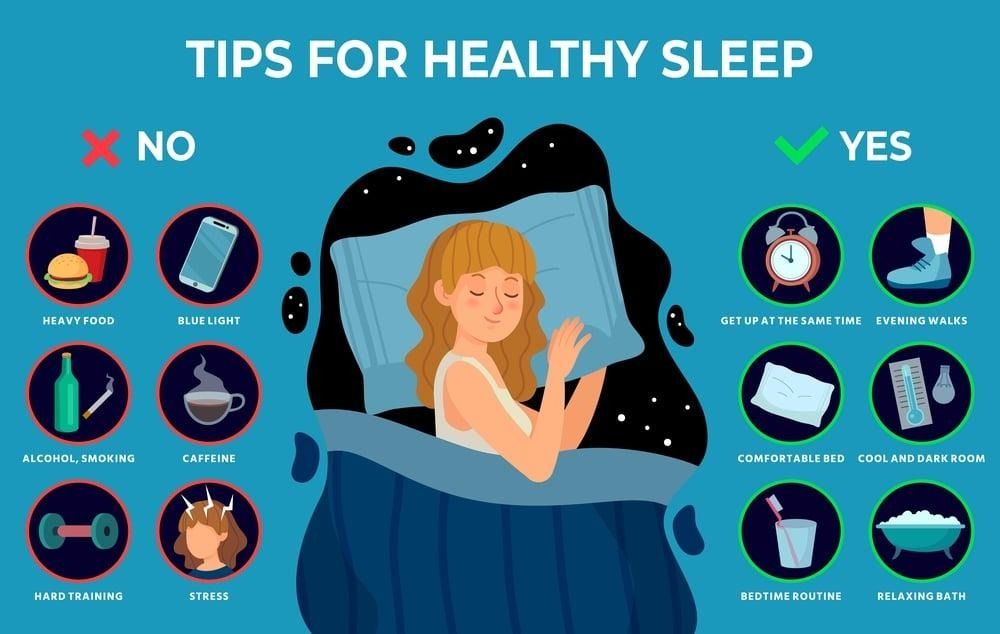

Establishing a healthy sleep routine is crucial for overall well-being and productivity. Let’s learn more about this topic below with Eggy Car, as we explore effective strategies to improve your sleep habits and achieve better rest.
Sleep is a fundamental biological process that plays a vital role in our physical and mental health. During sleep, our bodies undergo essential repairs, consolidate memories, and restore energy levels. Adequate sleep is crucial for maintaining cognitive function, emotional stability, and overall well-being. However, in today’s fast-paced world, many people struggle to get the recommended 7-9 hours of sleep per night, leading to a range of health issues and decreased quality of life.
The consequences of poor sleep are far-reaching and can impact various aspects of our lives. Chronic sleep deprivation has been linked to increased risk of obesity, cardiovascular disease, diabetes, and weakened immune function. Moreover, lack of sleep can impair cognitive performance, affecting memory, decision-making, and problem-solving abilities. It can also contribute to mood disorders, such as anxiety and depression, and increase the likelihood of accidents and injuries due to reduced alertness.
Recognizing the importance of sleep is the first step towards building a healthy sleep routine. By prioritizing sleep and implementing effective strategies, we can improve our overall health, productivity, and quality of life. In the following sections, we will explore practical tips and techniques to help you establish a sleep routine that works for you.
One of the key factors in establishing a healthy sleep routine is creating an environment that promotes restful sleep. Your bedroom should be a sanctuary dedicated to relaxation and rest. Start by assessing your sleeping space and making necessary adjustments to optimize it for sleep.
First, consider the temperature of your bedroom. Studies have shown that the ideal sleeping temperature is between 60-67°F (15-19°C). A room that is too warm or too cold can disrupt your sleep, causing you to wake up frequently during the night. Invest in a programmable thermostat to maintain a consistent temperature throughout the night.
Next, focus on minimizing light exposure in your bedroom. Darkness is essential for the production of melatonin, the hormone that regulates our sleep-wake cycle. Use blackout curtains or shades to block out external light sources, and remove or cover any electronic devices that emit light. If complete darkness is not possible, consider using a sleep mask to create a dark environment for your eyes.
Noise can be a significant disruptor of sleep, even if you don’t consciously wake up. Reduce noise pollution in your bedroom by using earplugs, a white noise machine, or a fan to create a consistent background sound that masks sudden noises. If you live in a noisy area, consider soundproofing your bedroom or using a sound machine that mimics soothing nature sounds.
The comfort of your bed and bedding plays a crucial role in your sleep quality. Invest in a supportive mattress and pillows that suit your sleeping position and preferences. Choose breathable, comfortable bedding materials that help regulate your body temperature throughout the night. Regularly wash your bedding to maintain a clean and hygienic sleep environment.
Lastly, declutter your bedroom and keep it organized. A tidy space can help promote a sense of calm and relaxation, making it easier to unwind before bed. Remove work-related items, exercise equipment, and other distractions from your sleeping area to create a space dedicated solely to rest and relaxation.
Consistency is key when it comes to building a healthy sleep routine. Our bodies thrive on regularity, and maintaining a consistent sleep schedule can help regulate our internal clock, known as the circadian rhythm. This biological clock influences various physiological processes, including hormone production, body temperature, and sleep-wake cycles.
To establish a consistent sleep schedule, start by setting a fixed bedtime and wake-up time, even on weekends. Choose a bedtime that allows you to get the recommended 7-9 hours of sleep, based on when you need to wake up in the morning. Stick to this schedule as closely as possible, allowing for no more than a 30-minute variation on weekends or special occasions.
It’s important to note that consistency doesn’t mean rigidity. Life events and social commitments may occasionally disrupt your sleep schedule. When this happens, try to return to your regular schedule as soon as possible. Avoid the temptation to “catch up” on sleep by sleeping in excessively on weekends, as this can disrupt your circadian rhythm and make it harder to fall asleep at your usual bedtime.
To help you maintain a consistent sleep schedule, consider using a sleep tracking app or device. These tools can help you monitor your sleep patterns, set reminders for bedtime, and provide insights into your sleep quality. Many smartphones now come with built-in sleep tracking features, or you can choose from a variety of third-party apps and wearable devices.
An essential part of establishing a consistent sleep schedule is developing a relaxing bedtime routine. This routine signals to your body that it’s time to wind down and prepare for sleep. Your bedtime routine should begin about 30-60 minutes before your intended sleep time and consist of calming activities that help you transition from wakefulness to sleep.
Start by dimming the lights in your home as bedtime approaches. This helps signal to your body that it’s time to start producing melatonin, the sleep hormone. Avoid exposure to bright lights, especially the blue light emitted by electronic devices, which can suppress melatonin production and make it harder to fall asleep.
Incorporate relaxing activities into your bedtime routine, such as reading a book, listening to soothing music, or practicing gentle stretching or yoga. Some people find it helpful to take a warm bath or shower before bed, as the subsequent drop in body temperature can promote sleepiness.
Consider incorporating mindfulness or meditation practices into your bedtime routine. These techniques can help calm your mind, reduce stress and anxiety, and prepare you for a restful night’s sleep. There are numerous guided meditation apps and resources available that specifically focus on sleep and relaxation.
Avoid stimulating activities or conversations in the hour leading up to bedtime. This includes watching intense TV shows, engaging in work-related tasks, or having emotionally charged discussions. Instead, focus on activities that promote relaxation and peace of mind.
Building a healthy sleep routine extends beyond what you do in the bedroom. Your daily habits and lifestyle choices can significantly impact your sleep quality. By making conscious decisions throughout the day, you can set yourself up for better sleep at night.
Regular exercise is one of the most effective ways to improve sleep quality. Engaging in physical activity during the day can help reduce stress, improve mood, and promote better sleep at night. Aim for at least 30 minutes of moderate exercise most days of the week. However, be mindful of the timing of your workouts. Intense exercise close to bedtime can be stimulating and make it harder to fall asleep. Try to finish your workout at least 2-3 hours before bedtime.
Your diet plays a crucial role in your sleep quality. Avoid heavy meals close to bedtime, as digestion can interfere with sleep. If you’re hungry before bed, opt for a light snack that combines complex carbohydrates and protein, such as whole-grain crackers with cheese or a small bowl of unsweetened cereal with milk. Be mindful of your caffeine intake, especially in the afternoon and evening. Caffeine can stay in your system for up to 8 hours, so consider cutting off caffeine consumption by early afternoon.
Alcohol, while it may initially make you feel drowsy, can disrupt your sleep later in the night. It interferes with your sleep cycles, leading to less restful sleep and more frequent awakenings. If you choose to drink alcohol, do so in moderation and avoid consuming it close to bedtime.
Managing stress is crucial for maintaining good sleep habits. Chronic stress can lead to insomnia and other sleep disorders. Incorporate stress-reduction techniques into your daily routine, such as deep breathing exercises, progressive muscle relaxation, or journaling. Consider setting aside time each day to practice these techniques, helping to create a buffer between the stresses of daily life and your bedtime.